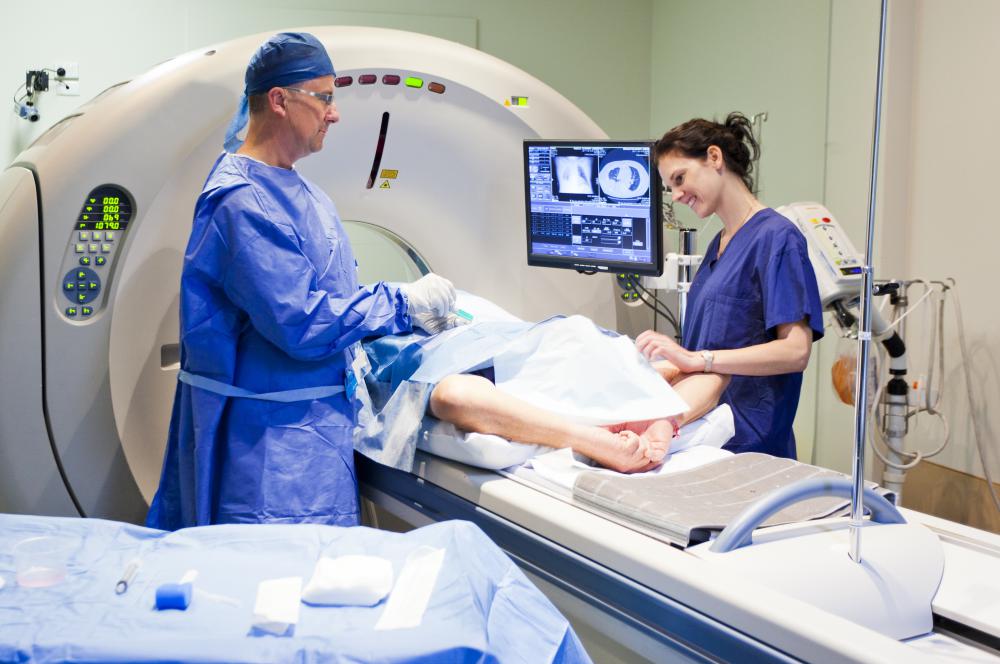At TheHealthBoard, we're committed to delivering accurate, trustworthy information. Our expert-authored content is rigorously fact-checked and sourced from credible authorities. Discover how we uphold the highest standards in providing you with reliable knowledge.
What is the Femoral Nerve?
The femoral nerve is located inside the leg and provides muscles that help the leg to bend and straighten. It also allows people to feel sensations within the front part of the thigh and a section of the lower leg. When a person loses sensation or movement in the leg, he or she suffers from femoral nerve dysfunction.
Systemic disorders, or disorders affecting the entire body, can result in the damage of femoral nerves. A person can also suffer from damage to this nerve when he or she experiences direct trauma to the area. Prolonged nerve compression due to the presence of a tumor can often cause femoral nerve damage as well.

Other situations can interfere with the proper function of femoral nerves. For example, this particular nerve can be damaged because of the insertion of a catheter in the femoral artery. A pelvic fracture or a disease that damages the nerves may negatively interfere with femoral nerves as well.
Medical conditions such as polyarteritis nodosa or diabetes mellitus can cause damage to multiple nerves, thereby affecting the femoral nerves. Abscesses and internal bleeding in the pelvis or abdomen have also been known to cause femoral nerve damage. Something as simple as lying on the back with both thighs and legs flexed while undergoing surgery or a diagnostic procedure has brought about femoral nerve dysfunction in some patients.
Symptoms of femoral nerve dysfunction include weakness, tingling, burning, or numbness in the knee or leg. People with femoral nerve damage may feel that their knees buckle. They may even have trouble maneuvering up and down stairs.

A medical exam is required in order to verify that femoral nerves are damaged. The doctor will examine the patient to see if he or she has this particular type of nerve damage by examining the nerves and muscles. If a patient experiences weakness in the knee or hip when attempting to straighten the knee or bend the hip, he or she could possibly suffer from damaged femoral nerves.

Doctors often check to see if the patient's knee jerk reflex is working properly. When the doctor tests the patient's knee reflexes, this particular reflex may be diminished or even nonexistent. Sample medical tests may include a magnetic resonance imaging (MRI), electromyography (EMG), or nerve conduction velocity tests, which measure how quickly signals pass through the nerves. Blood tests, x-rays, scans, and other tests tailored to a patient's specific needs may also be conducted.
AS FEATURED ON:
AS FEATURED ON:


















Discussion Comments
@closerfan12 -- From what I read, symptoms of femoral nerve damage symptoms are kind of hard to mistake. There's not a whole lot that can cause prolonged burning, tingling, and numbness in your thighs.
Of course it could be caused by muscle pain, but it's usually kind of hard to mistake nerve pain for a sore muscle. It's the kind of thing that you definitely know when you experience it.
Besides, I think that the whole leg collapsing thing is pretty conclusive...
The lateral femoral cutaneous nerve is one of the biggies -- problems such as femoral cutaneous nerve compression or meralgia paresthetica can cause awful pain.
Many people who experience problems with their femoral or genito-femoral nerves can undergo burning, tingling, and numbness in their thighs, along with balance problems, as the article said.
However, in general, femoral nerve damage is reversible, if you catch it early enough -- which is good news. So if you think that you have damage to your femoral nerve, or just thigh pain in general, do see your doctor or orthopedist about it. The earlier you catch these things, the better chance you have of curing them.
What are some other femoral nerve damage symptom? Or rather, how can I distinguish femoral nerve pain symptoms from other similar issues with the thigh?
Post your comments